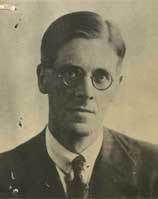|
Fenner Brockway |

I was only 15 years old when I met Fenner Brockway - but I was a pretty politically precocious 15-year old. Mind you, in those days, it was impossible to grow up in the industrial area of South Wales without becoming politically involved. And although I didn't exactly grow up there, I had arrived as a well matured left-winger as a consequence of my exposure to a London family that included members of the Communist Party, a volunteer with the International Brigades in Spain, and even having been carried on my father's shoulders during marches denying Oswald Mosley's fascists right of passage in the East End of London.
There is no way I can remember the subject of the talk that Fenner Brockway gave on that occasion to the Ammanford branch of the Workers' Eductional Association in 1945. I remember travelling by bus from Llanelli with Betty, the daughter of my history teacher Frank Harris of the Grammar School and also the "special friend" of the geography teacher, whose name eludes me. I do, however, recall that the geography teacher was a staunch communist who, in lecturing us on one occasion as to the different fuels available in South Wales mentioned paper as being the least effective, and needing far too great a quantity to come anywhere near the heat obtainable from a single nugget of South Wales' anthracite: "That doesn't matter" he said, "providing you use your Daily Expresses and Daily Telegraphs and not your Daily Workers". He was missing one ear, that had been severed, and was the subject of much conjecture amongst students, the majority decision being that it had been the subject of a wielded sword by an Arab during the war. But which war, and which arena, was never established. He grew his hair long on that side in an effort to disguise the missing organ.
This has taken us a long way from Fenner Brockway. Quite a digression, in fact.
So, reverting to that fateful meeting in Ammanford. There were two significant factors for me. Firstly, he was perhaps the tallest person I had ever met up to that date, a long, lanky figure striding into the meeting room. Also I had never previously met anyone who was so important in my estimation. I knew he had been born in India; I knew he had served a prison sentence during the First World War because of his conscientious objection; I knew he was a leading member of the Independent Labour Party which was poised to the right of the Communist Party and to the left of the Labour Party. I knew he was Editor of the ILP newspaper. I knew that he had at least a dozen published books to his name.
After his lecture I approached him somewhat timorously with a question that I was unwilling to pose during question time. I cannot, of course, remember what it was, but it certainly would have been connected with my desire to be a writer. The advice he gave me, possibly related to the question I asked him, was to keep a notebook and use it daily, to write down whatever thoughts occurred to me, or whatever significant event had happened to me. I actually bought a book specifically for that purpose and the first thing I wrote in it was an essay on his lecture. I now confess to my shame that, a few years ago, when clearing out drawers and files from my office, I came across that pocket-sized, red-bound note book and it was completely empty apart from the first three pages devoted to my impressions of Fenner Brockway. I tore them out and threw them in my waste-basket. I wish I had them before me now. Idiot!
It was once said about someone (it has probably been said about many such someones) that "he will end up in prison or the House of Lords". The English Establishment actually has a history of first imprisoning people and subsequently bestowing honours on them Fenner Brockway who was a staunch critic of the Establishment with his anti-war, anti-racial and anti-colonial, ended his years as Baron Brockway.